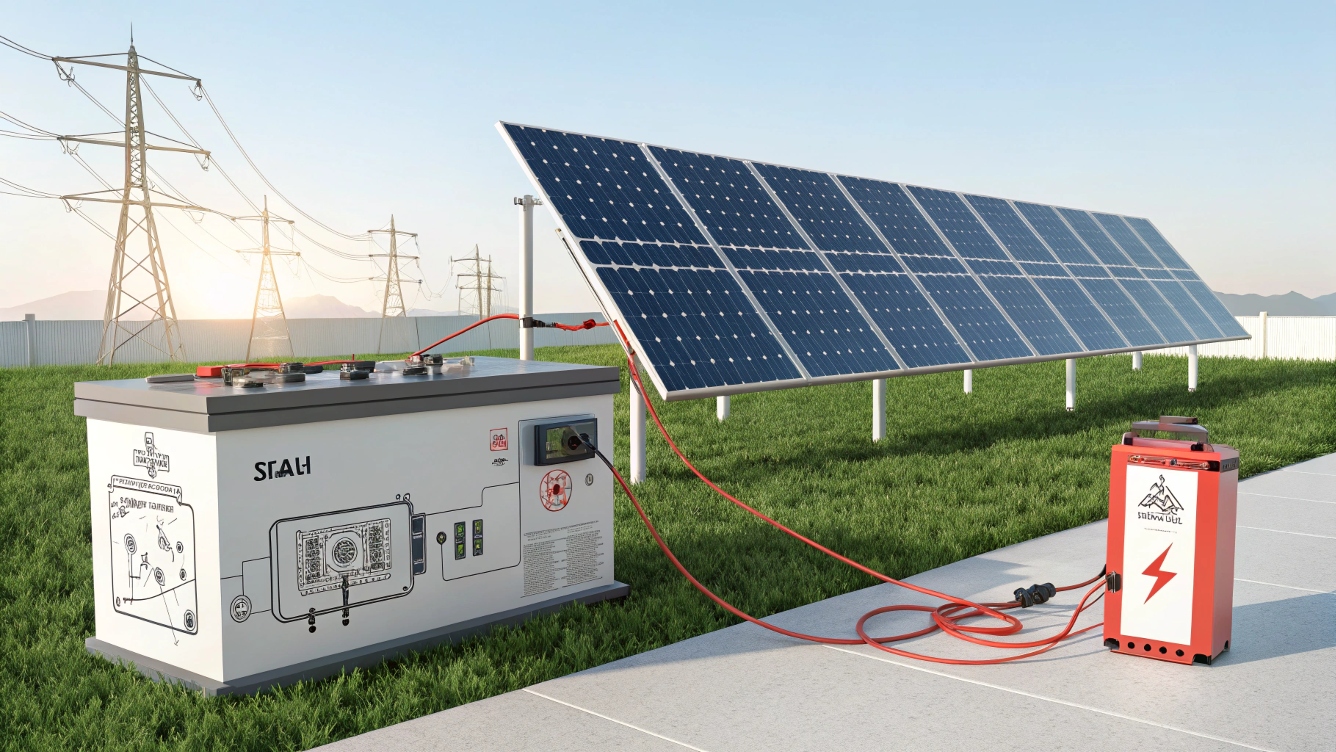How Many Solar Panels Do You Need to Charge a 300Ah Lithium Battery?
Understanding the 300Ah Lithium Battery: Power Storage Revolution
A 300Ah lithium battery (like our stackable battery pack solutions) is a game-changer for renewable energy systems. Unlike traditional lead-acid batteries, lithium iron phosphate (LiFePO4) batteries offer:
- Higher Efficiency: 95-98% round-trip efficiency vs. 70-85% for lead-acid (Wikipedia: Lithium iron phosphate battery).
- Longer Lifespan: 3,000-5,000 cycles at 80% depth of discharge (DoD).
- Compact Design: 50% lighter and 30% smaller than equivalent lead-acid models.
Why Voltage Matters
- 12V systems: Common for RVs and small cabins (3,600Wh total capacity).
- 24V/48V systems: Better for homes with high-power appliances (e.g., 24V = 7,200Wh).
Solar Panel Calculation: From Basics to Advanced Scenarios
Step 1: Determine Daily Energy Needs
Assume you drain a 300Ah 12V battery to 50% daily:
1,800Wh ÷ 5 peak sun hours = 360W solar input required.
Real-World Adjustment:
- Cold climates? Add 20% buffer for reduced panel efficiency in winter.
- Tropical regions? Reduce by 10% due to consistent sunlight.
Step 2: Factor in System Losses
Solar setups lose energy through:
- Charge Controllers: PWM (75-80% efficiency) vs. MPPT (95-98%).
- Wiring: 2-5% loss in DC cables.
- Temperature: Panels lose 0.3-0.5% efficiency per °C above 25°C.
Formula:
Total Solar Wattage = (Daily Wh ÷ Sun Hours) × 1.3 (30% buffer).
Example: 1,800Wh ÷ 5h × 1.3 = 468W.
Solar Panel Configurations for Different Lifestyles
Option 1: Compact RV Setup
- Panels: Six 100W flexible monocrystalline panels (600W total).
- Controller: 40A MPPT (handles up to 520W for 12V systems).
- Battery: Single 300Ah stackable battery pack (View Product).
Best For: Weekend campers needing 2-3 days of autonomy.
Option 2: Full-Time Off-Grid Home
- Panels: Twelve 200W bifacial panels (2,400W).
- Controller: Two 100A MPPT controllers.
- Battery Bank: Four stackable battery packs
Best For: Families running refrigerators, pumps, and LED lighting.
Why Stackable Battery Packs Are a Game-Changer
Case Study: Scaling a Cabin System
- Year 1: 300Ah battery + 800W solar (covers lights and phone charging).
- Year 2: Add a second stackable battery pack + 400W solar (supports a mini-fridge).
- Year 5: Expand to 1,200Ah (4 packs) + 2kW solar (powers a well pump).
Key Features of Our Stackable System:
- Plug-and-Play Design: No complex wiring; connect via CAN bus.
- Smart Balancing: Built-in BMS prevents overcharging between modules.
- Mixed Voltage Support: Combine 12V/24V packs for custom setups.
Advanced Optimization Techniques
1. Pair with Hybrid Inverters
A 3kW hybrid inverter (GYCX Solar Inverter) lets you:
- Use solar + grid/generator power simultaneously.
- Sell excess energy back to the grid (if local regulations allow).
2. Seasonal Angle Adjustments
- Summer: Tilt panels at (latitude – 15°) to avoid midday glare.
- Winter: Tilt at (latitude + 15°) to capture low-angle sun.
Pro Tip: Use a $20 tilt meter app for precision.
3. Battery Maintenance Hacks
- Storage: Keep at 50% charge if unused for >1 month.
- Cleaning: Wipe terminals with baking soda mix monthly.
Hybrid Solutions for Unpredictable Weather
Wind-Solar Combos
In cloudy regions like Seattle:
- Add a 400W vertical-axis wind turbine ($600-$1,200).
- Works day/night, complementing solar.
Generator Backup
A 2,200W propane generator:
- Recharges a 300Ah battery in 4-6 hours.
- Integrates with auto-start inverters during emergencies.
Cost Breakdown: Budget vs. Premium Builds
| Component | Budget Option ($) | Premium Option ($) |
|---|---|---|
| 300Ah Battery | 1,200 (LiFePO4) | 1,800 (Stackable) |
| Solar Panels (600W) | 750 (Poly) | 1,200 (Mono PERC) |
| MPPT Controller | 120 (40A) | 300 (80A Bluetooth) |
| Total | 2,070 | 3,300 |
Note: Premium builds offer 25% longer lifespan and remote monitoring.
FAQs: Beyond the Basics
Q: Can I mix old and new stackable battery packs?
A: Yes, but limit cycles to 80% DoD for older modules to prevent imbalance.
Q: What happens if it’s cloudy for a week?
A: Design systems for 3-5 days of autonomy or include a backup generator.
Q: Are lithium batteries safe in freezing temps?
A: Our stackable packs include self-heating below -20°C (optional feature).
Conclusion: Build Smarter with Modular Solar Solutions
Charging a 300Ah lithium battery efficiently requires 600-1,000W of solar panels, smart controllers, and scalable stackable battery packs. Whether you’re powering a tiny home or a remote clinic, modular systems adapt to your growing needs.
Next Steps:
- Calculate your exact needs with Solar Calculator Tool.
- Explore ready-to-ship Off-Grid Kits.
- Watch our Installation Tutorials for DIY tips.
References & Citations
- Lithium battery efficiency: Wikipedia: Lithium iron phosphate battery.
- Solar tilt angles: NASA Surface meteorology and Solar Energy Dataset.
- Cost analysis: 2023 NREL Residential Solar Trends Report.




